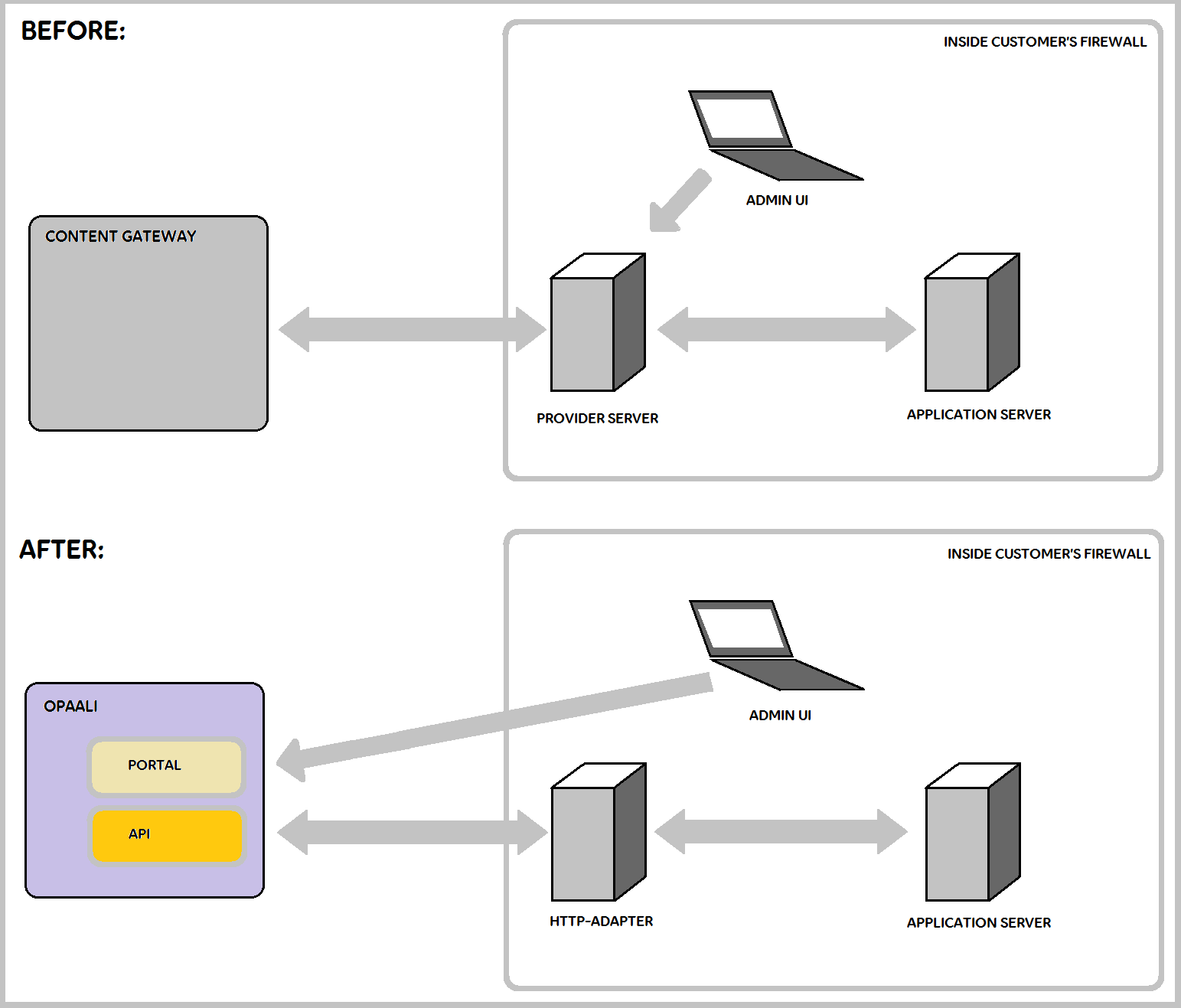Last summer, in article HTTP adapter, I mentioned that there is source code for a http_adapter in the sample_applications directory of this GitHub repository. Now in the Releases section there are the first ready-to-run Release packages.
Limited functionality
The http_adapter acts as a gateway, which you can drop in place of your existing Content Gateway Provider Server. It looks like the old CGW http interface towards your application, but uses Opaali and its Opaali API to do the actual sending of the message.
 CGW vs. Opaali
CGW vs. Opaali
Currently, it only supports sending a text msg, from a specified number, to specified recipients. That is just enough functionality for us replacing one of our existing in-house Provider Servers without needing to make changes to the dozens of internal applications sending MT text messages through it.
Getting Started
The Release page should have sufficient instructions for getting started, but I’ll summarise them here
- download the SmsServer.jar file (don’t bother downloading the Source code packages, you don’t need them now)
- download and install Java 1.8 runtime, if you don’t have it already
- make the needed configuration file
- start the SmsServer from command line
- test if it works (if not, fix the problem…)
The Configuration file
Here is an example of a configuration file:
# HTTP adapter configuration file
#
# common config parameters are at the beginning
# server port
port=8081
# API host name
#API_HOST=api.sonera.fi
#API_HOST=api.opaali.telia.fi
# log file name
log_file=OpaaliLog.txt
# log level: 0=NONE, 1=ERROR, 2=WARNING, 3=INFO, 4=DEBUG,
log_level=2
# always log to stderr too: 0=no, 1=yes
log_stderr=1
# append to existing log file: 0=no, 1=yes
log_append=1
# service sections [name:type]
[send:cgw]
# character set for CGW API side
cgwCharset=ISO-8859-1
#cgwCharset=UTF-8
# replace these with your own credentials (these won't work)
applicationUserName=b535b0c5e5ae815cea82db6b32b5095a
applicationPassword=1%AMCC?u
# end of config"
port
- you need to specify the server port where this will run on your local machine
port=8081
log configuration
- you probably want to configure a log file and the level of logging
- you can choose to output log to standard error output of the console window
- you can also choose whether to clear existing log at start or append to it
- (there is no built-in support for log rotation or other finesses)
log_file=mylogfile.log log_level=3 log_stderr=1 log_append=1
service section
- currently only one service is implemented, a cgw-style send service
- you can choose the service name, we use send as default
- you may need to specify the character set you want to use in your requests towards the send service (this will depend on your platform and how you are encoding special characters)
- you also need to specify the applicationUserName and applicationPassword which you have configured for your application in Opaali Portal
[send:cgw] cgwCharset=ISO-8859-1 applicationUserName=b535b0c5e5ae815cea82db6b32b5095a applicationPassword=1%AMCC?u
Running the Server
If you have configured the Java Runtime in your execution path, you can run the server using this command:
$ java -jar SmsServer.jar
(assuming you have saved the jar file as SmsServer.jar in the current directory and your configuration file is in the same directory and called config.txt)
$ java -jar SmsServer-0.1.1-beta.jar
2017-10-16 13:51:06,494 INFO Default CharSet:windows-1252
2017-10-16 13:51:06,600 INFO processing configuration file "config.txt"
2017-10-16 13:51:06,600 INFO comment:# common config parameters are at the beginning
2017-10-16 13:51:06,601 INFO comment:# server port
2017-10-16 13:51:06,601 INFO config :port=8877
2017-10-16 13:51:06,602 INFO comment:
2017-10-16 13:51:06,602 INFO comment:# log file name
2017-10-16 13:51:06,603 INFO config :log_file=OpaaliLog.txt
2017-10-16 13:51:06,603 INFO comment:# log level: 0=NONE, 1=ERROR, 2=WARNING, 3=INFO, 4=DEBUG,
2017-10-16 13:51:06,604 INFO config :log_level=4
2017-10-16 13:51:06,604 INFO comment:# always log to stderr too: 0 =no, 1=yes
2017-10-16 13:51:06,605 INFO config :log_stderr=1
2017-10-16 13:51:06,606 INFO comment:# append to existing log file: 0=no, 1=yes
2017-10-16 13:51:06,606 INFO config :log_append=1
2017-10-16 13:51:06,607 INFO comment:
2017-10-16 13:51:06,607 INFO comment:# service sections [name:type]
2017-10-16 13:51:06,607 INFO section:[send:cgw]
2017-10-16 13:51:06,609 INFO config :cgwCharset=UTF-8
2017-10-16 13:51:06,609 INFO config :applicationUserName=b535b0c5e5ae815cea82db6b3b25095a
2017-10-16 13:51:06,611 INFO config :applicationPassword=********
2017-10-16 13:51:06,613 INFO comment:
2017-10-16 13:51:06,613 INFO comment:# end of config
2017-10-16 13:51:06,614 INFO comment:
2017-10-16 13:51:06,614 INFO end of configuration data reached
2017-10-16 13:51:06,951 INFO CGW HTTP API started
(you can terminate the server by hitting Ctrl-C in the command window)
Calling the http_adapter
You can send a text message just like with CGW by making a HTTP GET -request to the server:
$ curl -v 'http://localhost:8877/send?from=$JPLa&to=%2B358408551080&msg=Hello+World!'
* timeout on name lookup is not supported
* Trying 127.0.0.1...
* Connected to localhost (127.0.0.1) port 8877 (#0)
> GET /send?from=$JPLa&to=%2B358408551080&msg=Hello+World! HTTP/1.1
> Host: localhost:8877
> User-Agent: curl/7.47.1
> Accept: */*
>
< HTTP/1.1 200 OK
< Date: Mon, 16 Oct 2017 11:21:14 GMT
< Content-type: text/html
< Content-length: 131
<
<html><head><title>Send SMS result</title></head><body><h2>Delivery result</h2>Success: tel:+358408551080: OK<br><br></body></html>* Connection #0 to host local
host left intact
$
Due to the architecture of the http-adapter (it has no internal queue, so your request will wait until Opaali API has completed the send operation) and because emphasis was put on the clarity of code instead of performance (this is sample code, after all) it is unlikely you would hit the 10TPS limit (2TPS was reached in tests). But you have the source code, you can make it better yourself: http_adapter source code in GitHub
 JPLa is a member of the Content Gateway (CGW) to Opaali migration team, specialising in programming related issues and API usage.
JPLa is a member of the Content Gateway (CGW) to Opaali migration team, specialising in programming related issues and API usage.